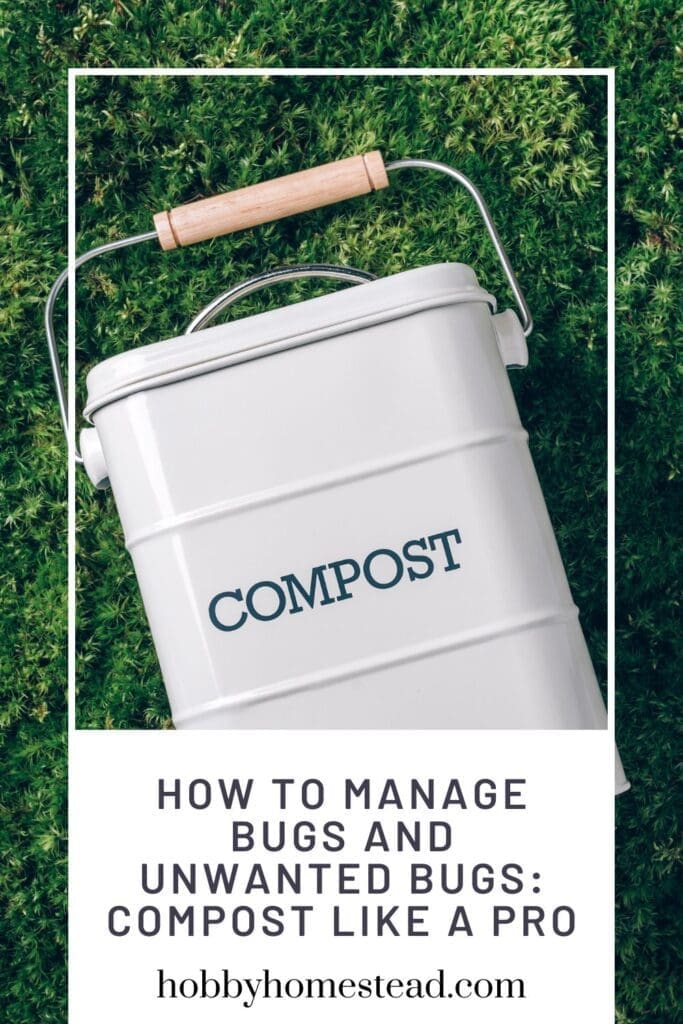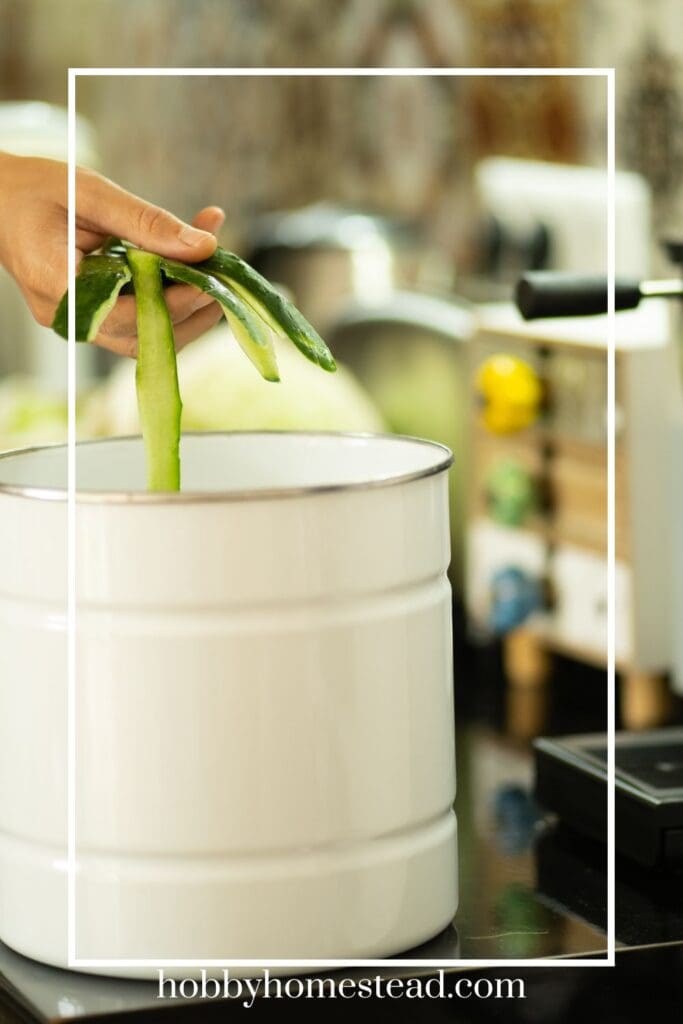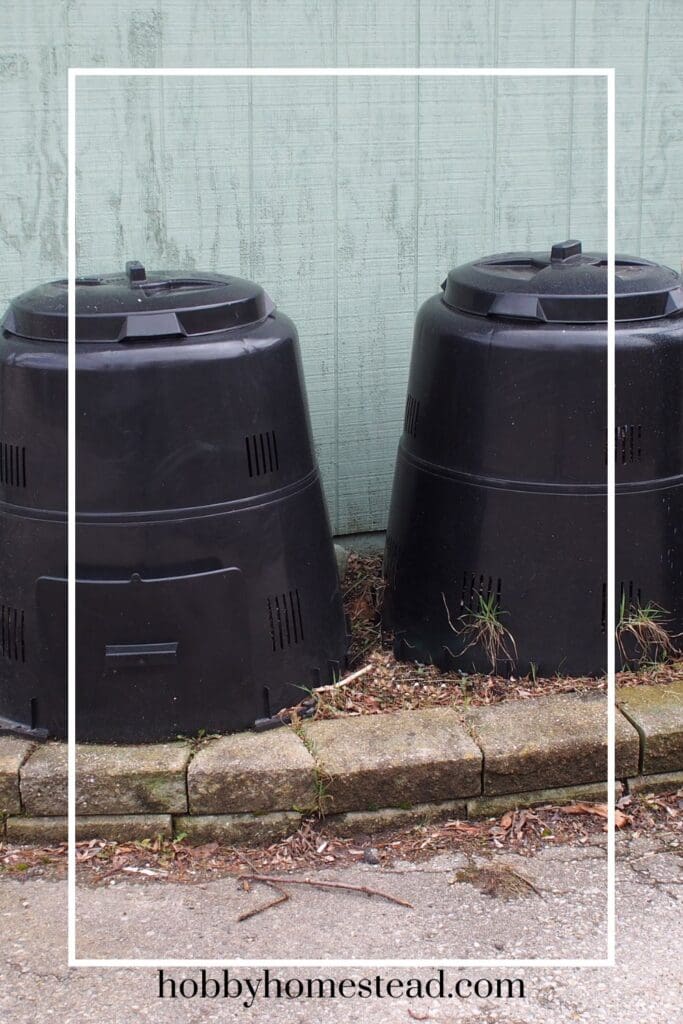Let’s talk about how to manage bugs in a compost bin. If you’ve started composting, you’re already contributing to reducing food waste and creating nutrient-rich compost for your garden. But when it comes to managing bugs in your compost bin, things can get a little buggy—literally!
You might spot fruit flies, pill bugs, or even fire ants, making you wonder if these visitors are helpful or just unwanted pests.
Don’t worry; composting naturally attracts insects, but with a few simple tips, you can manage them and keep the decomposition process running smoothly.

Compost Like a Pro
Composting is a fantastic way to repurpose kitchen scraps, yard waste, and other organic materials into nutrient-rich compost. But there’s one challenge that every composter faces: bugs!
From vinegar flies to soldier flies, insects are often drawn to the organic matter in your compost heap. Not all bugs are bad, though!
In fact, many play crucial roles in breaking down food scraps. The key is knowing which bugs to keep around and how to control the ones you don’t want.
Top 5 Tips for Managing Bugs in Your Compost Bin
Layer Your Compost Correctly
A well-balanced compost bin with alternating layers of green (nitrogen-rich) and brown (carbon-rich) materials helps reduce the presence of bugs. Place food scraps like banana peels and vegetable peels under a layer of yard waste or dry leaves to discourage fruit flies and other pests.
Avoid Adding Meat and Dairy Products
Meat scraps and dairy products are a magnet for unwanted pests like rodents and flies. Stick to plant matter, coffee grounds, and grass clippings to keep your compost pile more balanced and bug-free.
Use a Compost Thermometer for Hot Composting
Maintaining a hot compost pile is one of the best ways to speed up decomposition and discourage invasive species. When the pile reaches temperatures of 130-150°F, the heat kills off many unwanted pests, including insect larvae.
Install Wire Mesh or Chicken Wire
To prevent small mammals and rodents from getting into your outdoor compost pile, use wire mesh or chicken wire around the base of your bin. This is also helpful for keeping rove beetles and other scavenging insects out.
Set Up DIY Fly Traps
Fruit flies, vinegar flies, and other pests can be controlled with simple fly traps. Place a jar with apple cider vinegar and dish soap near the compost to attract and drown adult flies without harming beneficial insects.

More Detailed Tips for Managing Bugs in Your Compost Bin
Turn Your Compost Regularly
Turning the compost pile on a regular basis aerates the organic material and helps it break down faster. The faster the decomposition process, the less attractive it is to flies and other pests. Make sure to flip the contents of the pile every few weeks for a good mix of materials.
Keep the Bin Covered
A compost bin with a lid helps to control moisture levels and prevents adult flies and other unwanted pests from laying eggs on organic material. This is especially important for an indoor compost bin. Just make sure the bin has small holes for airflow to keep the composting process going.
Balance the Green and Brown Elements
For managing bugs in your compost bin, several effective strategies can help. First, maintaining a proper balance between “greens” (like food scraps) and “browns” (like dead leaves or paper) can deter unwanted insects.
Vent the Bin
Keeping your compost well-ventilated but covered tightly with a lid is crucial to preventing flies from entering, as flies are particularly attracted to rotting fruits
Monitor Moisture Levels
Compost bins that are too wet can become a breeding ground for fungus gnats and other pests. Try to maintain the right balance of moisture by adding dry brown layers, such as stale bread, cardboard, or corn cobs. If your compost feels too damp, adding a layer of brown materials can help dry it out.
Use Diatomaceous Earth for Pest Control
Diatomaceous earth is a natural and effective way to control unwanted insects in your compost. Sprinkle it on top of the pile to deter ants, soldier flies, and other pests without harming beneficial insects like red worms and rove beetles. Diatomaceous earth works by damaging the exoskeleton of the bugs, leading to their eventual demise.
Avoid Plastic Wrap and Other Non-Compostable Materials
While it may seem obvious, be sure to avoid tossing plastic wrap, plastic bottles, or other non-compostable materials into your compost heap.
These items do not break down and may create habitats for unwanted pests. Stick to organic matter like vegetable peels and grass clippings for a healthy compost system.
Add Coffee Grounds and Eggshells
Coffee grounds and crushed eggshells are great additions to your compost pile. They not only improve the nutrient content of your compost but can also help deter pests. Eggshells, in particular, are a fantastic way to keep away slugs and snails.
Encourage Beneficial Insects
Not all bugs are bad! Beneficial insects like black soldier flies, red worms, and pill bugs help accelerate the composting process by breaking down food scraps and yard waste.
Their presence in your compost is actually a good sign that decomposition is working as it should.
Try Using Vinegar Fly Traps
If you notice a lot of vinegar flies or fruit flies buzzing around, try setting out a vinegar trap. Mix apple cider vinegar and dish soap in a jar and place it near the compost bin.
The flies will be attracted to the vinegar and trapped by the surface tension created by the dish soap.
Adding a Top Layer
If fruit flies become an issue, consider adding a layer of soil, leaves, or shredded paper to cover the compost, which can block the odor that attracts them.
Wash the Bin
For more persistent bug problems, washing the compost bin regularly or even freezing scraps before composting can also help manage the insect population.
Prevent Rodents with Rodent-Resistant Bins
If you’re dealing with unwanted wildlife like rats or small mammals, consider investing in a rodent-resistant compost bin.
These bins are designed with tight-fitting lids and small holes to keep critters out while still allowing air to flow through.
Know the Good Guys from the Bad
Many insects play important roles in the composting process. For example, sow bugs and pill bugs feed on decaying plant matter and help break it down.
Soldier flies, though large and sometimes intimidating, are carrion-eating species that also aid in decomposition. Understanding which bugs are beneficial and which are pests will help you manage your compost bin more effectively.

Are All Bugs Bad in Compost?
Not at all! Bugs like red worms, rove beetles, and black soldier fly larvae are often referred to as the “good guys” in composting. They help break down kitchen scraps and organic matter, speeding up the decomposition process.
Additionally, other insects like pillbugs and maggots are also good to have for the composting process, helping break down organic matter faster. Unless there’s an overwhelming infestation, these critters are typically not harmful
Other insects like fruit flies and fungus gnats may seem annoying, but they usually aren’t a big deal unless they become a nuisance. The key is to strike a balance, ensuring the bugs that help your compost thrive stick around while keeping unwanted pests at bay.
Bugs in Your Kitchen Compost Bin
It’s perfectly normal to find bugs in your kitchen compost bin, and most of the time, they’re actually helping the composting process. What’s important is identifying which bugs are beneficial and which are unwanted pests.
Common insects like vinegar flies (also known as fruit flies) and houseflies are often attracted to decomposing organic material, such as food scraps and plant matter. While these flies can be a nuisance, their presence usually indicates that your compost is working as intended.
Maggots in Your Kitchen Compost
Finding maggots in your kitchen compost bin may be alarming at first, but there’s no need to panic. Maggots, especially those of black soldier flies, play a helpful role in speeding up the decomposition process by breaking down organic waste quickly.
If you’d prefer to keep maggots out, covering your compost with a layer of brown materials, such as leaves or paper, or securing a wire mesh over the bin, can help prevent flies from laying eggs.
These practices can minimize pests while maintaining a healthy composting environment.
Finding the Right Balance
Managing bugs in your compost bin is all about maintaining balance. By using wire mesh to keep out larger pests, setting up DIY fly traps, and regularly turning your compost, you can keep unwanted bugs in check without affecting the decomposition process.
Remember, beneficial insects like soldier flies and rove beetles can actually speed up the composting process, so they deserve a place in your compost system.
References
Food Gardening Network. Tips for Managing Bugs in Compost Bins.
HaveGarden.com. How to Get Rid of Bugs in my Compost?


